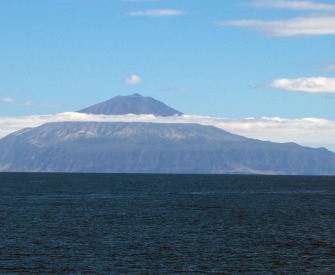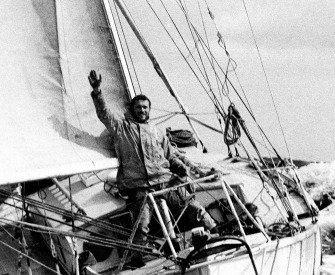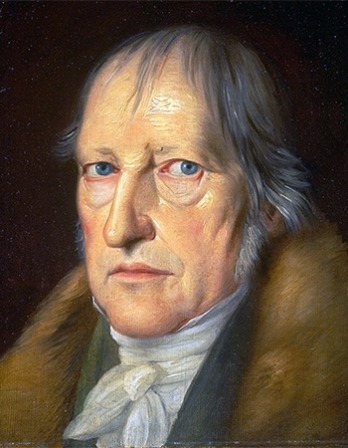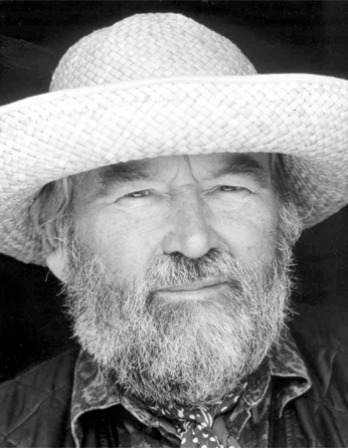Childhood knows what it wants—to leave childhood behind.
—Jean Cocteau, 1947Young and at Sea
Joseph Conrad sets sail for points eastward.
“We made our way north. A breeze sprang up, and about noon all the boats came together for the last time. I had no mast or sail in mine, but I made a mast out of a spare oar and hoisted a boat awning for a sail, with a boathook for a yard.
She was certainly overmasted, but I had the satisfaction of knowing that with the wind aft I could beat the other two. I had to wait for them. Then we all had a look at the captain’s chart and, after a sociable meal of hard bread and water, got our last instructions. These were simple: steer north and keep together as much as possible. ‘Be careful with that jury-rig, Marlow,’ said the captain, and Mahon, as I sailed proudly past his boat, wrinkled his curved nose and hailed, ‘You will sail that ship of yours underwater if you don’t look out, young fellow.’ He was a malicious old man—and may the deep sea where he sleeps now rock him gently, rock him tenderly to the end of time!
“Before sunset a thick rain squall passed over the two boats, which were far astern, and that was the last I saw of them for a time. Next day I sat steering my cockleshell—my first command—with nothing but water and sky around me. I did sight in the afternoon the upper sails of a ship far away, but said nothing, and my men did not notice her. You see, I was afraid she might be homeward bound, and I had no mind to turn back from the portals of the East. I was steering for Java—another blessed name—like Bangkok, you know. I steered many days.
“I need not tell you what it is to be knocking about in an open boat. I remember nights and days of calm, when we pulled, we pulled, and the boat seemed to stand still, as if bewitched within the circle of the sea horizon. I remember the heat, the deluge of rain squalls that kept us baling for dear life (but filled our water cask), and I remember sixteen hours on end with a mouth dry as a cinder and a steering oar over the stern to keep my first command head on to a breaking sea. I did not know how good a man I was till then. I remember the drawn faces, the dejected figures of my two men, and I remember my youth and the feeling that will never come back anymore—the feeling that I could last forever, outlast the sea, the earth, and all men; the deceitful feeling that lures us on to joys, to perils, to love, to vain effort—to death; the triumphant conviction of strength, the heat of life in the handful of dust, the glow in the heart that with every year grows dim, grows cold, grows small, and expires—and expires, too soon, too soon—before life itself.
“And this is how I see the East. I have seen its secret places and have looked into its very soul; but now I see it always from a small boat, a high outline of mountains, blue and afar in the morning, like faint mist at noon, a jagged wall of purple at sunset. I have the feel of the oar in my hand, the vision of a scorching blue sea in my eyes. And I see a bay, a wide bay, smooth as glass and polished like ice, shimmering in the dark. A red light burns far off upon the gloom of the land, and the night is soft and warm. We drag at the oars with aching arms, and suddenly a puff of wind, a puff faint and tepid and laden with strange odors of blossoms, of aromatic wood, comes out of the still night—the first sigh of the East on my face. That I can never forget. It was impalpable and enslaving, like a charm, like a whispered promise of mysterious delight.
“We had been pulling this finishing spell for eleven hours. Two pulled, and he whose turn it was to rest sat at the tiller. We had made out the red light in that bay and steered for it, guessing it must mark some small coasting port. We passed two vessels, outlandish and high-sterned, sleeping at anchor and, approaching the light, now very dim, ran the boat’s nose against the end of a jutting wharf. We were blind with fatigue. My men dropped the oars and fell off the thwarts as if dead. I made fast to a pile. A current rippled softly. The scented obscurity of the shore was grouped into vast masses, a density of colossal clumps of vegetation, probably—mute and fantastic shapes. And at their foot the semicircle of a bench gleamed faintly, like an illusion. There was not a light, not a stir, not a sound. The mysterious East faced me, perfumed like a flower, silent like death, dark like a grave.
“And I sat weary beyond expression, exulting like a conqueror, sleepless and entranced as if before a profound, a fateful enigma.
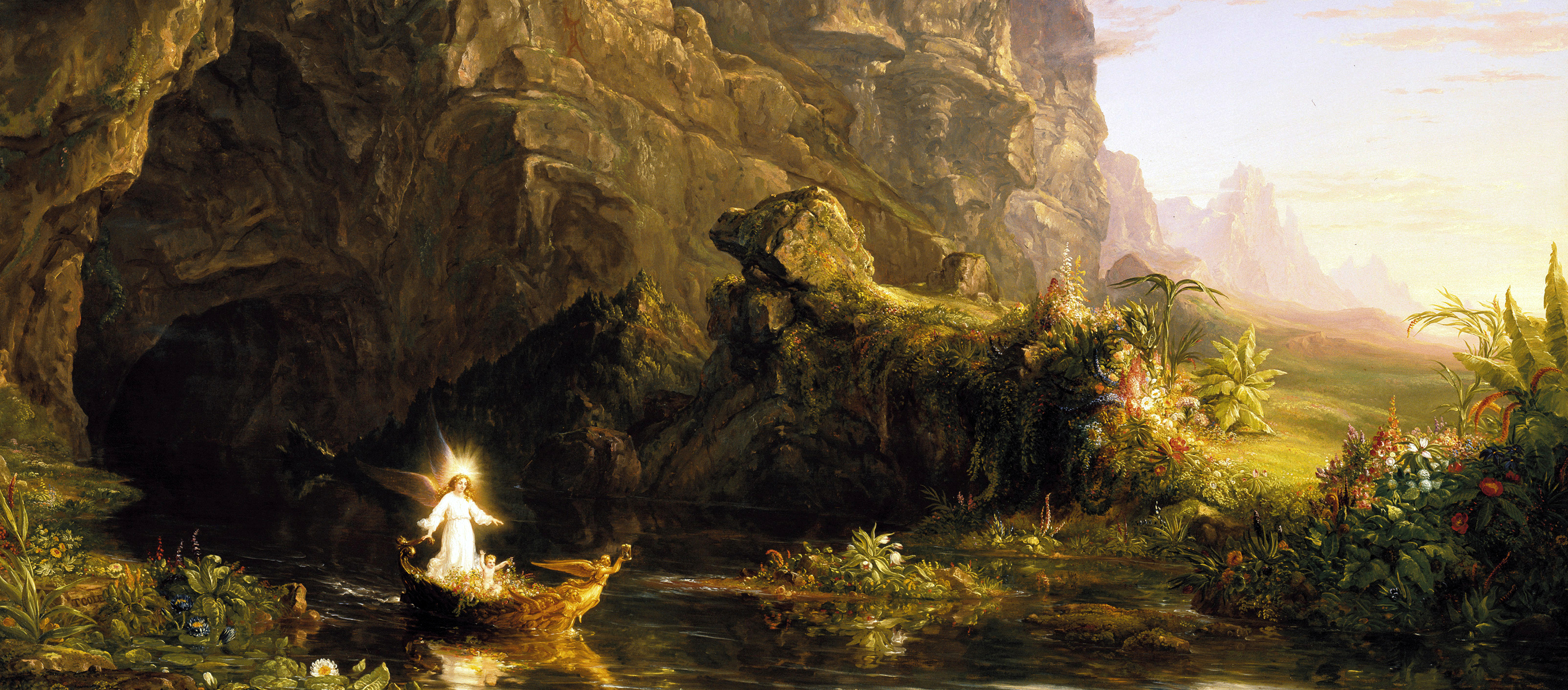
The Voyage of Life: Childhood, by Thomas Cole, 1839-40. Munson-Williams-Proctor Arts Institute.
“I pulled back, made fast to the jetty, and then went to sleep at last. I had faced the silence of the East. I had heard some of its language. But when I opened my eyes again, the silence was as complete as though it had never been broken. I was lying in a flood of light, and the sky had never looked so far, so high, before. I opened my eyes and lay without moving.
“And then I saw the men of the East—they were looking at me. The whole length of the jetty was full of people. I saw brown, bronze, yellow faces, the black eyes, the glitter, the color of an Eastern crowd. And all these beings stared without a murmur, without a sigh, without a movement. They stared down at the boats, at the sleeping men who at night had come to them from the sea. Nothing moved. The fronds of palms stood still against the sky. Not a branch stirred along the shore, and the brown roofs of hidden houses peeped through the green foliage, through the big leaves that hung shining and still like leaves forged of heavy metal. This was the East of the ancient navigators, so old, so mysterious, resplendent, and somber, living and unchanged, full of danger and promise. And these were the men. I sat up suddenly. A wave of movement passed through the crowd from end to end, passed along the heads, swayed the bodies, ran along the jetty like a ripple on the water, like a breath of wind on a field—and all was still again. I see it now—the wide sweep of the bay, the glittering sands, the wealth of green infinite and varied, the sea blue like the sea of a dream, the crowd of attentive faces, the blaze of vivid color—the water reflecting it all, the curve of the shore, the jetty, the high-sterned outlandish craft floating still, and the boat with the tired men from the West sleeping, unconscious of the land and the people and of the violence of sunshine. They slept thrown across the thwarts, curled on bottom boards, in the careless attitudes of death.The East looked at them without a sound.
“I have known its fascination since; I have seen the mysterious shores, the still water, the lands of brown nations, where a stealthy Nemesis lies in wait, pursues, overtakes so many of the conquering race, who are proud of their wisdom, of their knowledge, or their strength. But for me all the East is contained in that vision of my youth. It is all in that moment when I opened my young eyes on it. I came upon it from a tussle with the sea—and I was young—and I saw it looking at me. And this is all that is left of it! Only a moment; a moment of strength, of romance, of glamor—of youth!…A flick of sunshine upon a strange shore, the time to remember, the time for a sigh, and—goodbye!—night—goodbye…!”
He drank.
“Ah! The good old time—the good old time. Youth and the sea. Glamor and the sea! The good, strong sea, the salt, bitter sea, that could whisper to you and roar at you and knock your breath out of you.”
No wise man ever wished to be younger.
—Jonathan Swift, 1706He drank again.
“By all that’s wonderful it is the sea, I believe, the sea itself—or is it youth alone? Who can tell? But you here—you all had something out of life: money, love—whatever one gets on shore—and tell me, wasn’t that the best time, that time when we were young at sea; young and had nothing, on the sea that gives nothing, except hard knocks—and sometimes a chance to feel your strength—that only—what you all regret?”
And we all nodded at him: the man of finance, the man of accounts, the man of law, we all nodded at him over the polished table that like a still sheet of brown water reflected our faces, lined, wrinkled; our faces marked by toil, by deceptions, by success, by love; our weary eyes looking still, looking always, looking anxiously for something out of life, that while it is expected is already gone—has passed unseen, in a sigh, in a flash—together with the youth, with the strength, with the romance of illusions.

Joseph Conrad
From Youth. Charles Marlow is the narrator of this story within a story—and the one in Heart of Darkness—as well as of the novels Lord Jim and Chance. Leaving Cracow for Marseille at the age of sixteen in 1874, Conrad, the son of a Polish nobleman, made his earliest sea voyages aboard steamers bound for the West Indies—at one time running guns—and docked in England for the first time in 1878, knowing only a few words of the country’s language. He served sixteen years in the British Merchant Navy and published all his best-known works in English.
